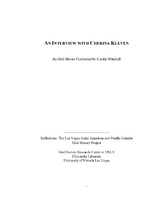Search the Special Collections and Archives Portal
Search Results

Juliana Urtubey oral history interview: transcript
Date
Archival Collection
Description
Oral history interview with Juliana Urtubey conducted by Nathalie Martinez and Barbara Tabach on May 24, 2021 for the Latinx Voices of Southern Nevada Oral History Project. Born in Colombia, Julia was able to immigrate with her family to the United States when she was six years old. The family lived in Chicago, Illinois and later in Phoenix, Arizona. Juliana moved to Las Vegas in 2013 and taught learners with special education needs at the elementary level. In 2021, she was named the National Teacher of the Year, the first Latina and the only Nevadan to ever hold the distinction. Juliana personally received the award from Dr. Jill Biden. Subjects discussed include: Colombia, Chicago, Illinois, National Teacher of the Year, and bilingual education.
Text

James Dean Leavitt oral history interviews: transcript
Date
Archival Collection
Description
Oral history interviews with James Dean Leavitt conducted by Claytee D. White on September 27 and October 4, 2022 for the Boyer Early Las Vegas Oral History Project. In this interview, Leavitt recalls his role in establishing a medical school at the University of Nevada, Las Vegas (UNLV), now known as Kirk Kerkorian School of Medicine. Leavitt was elected to the Board of Regents in 2004 while Jim Rogers was interim Chancellor of the Nevada System of Higher Education (NSHE), and he suggested the creation of an ad hoc committee Health Science Center Committee. In 2009, Leavitt became Chairman of the Board of Regents, Dan Klaich became Chancellor, and in the following year, Dr. Mark Doubrava joined the board. In May 2014, the planning dean was hired, Dr. Barbara Atkinson, and the UNLV School of Medicine was officially established on August 22, 2014.
Text

Cherina Kleven oral history interview: transcript
Date
Archival Collection
Description
Oral history interview with Cherina Kleven conducted by Cecilia Winchell on June 9, 2021 for Reflections: The Las Vegas Asian American and Pacific Islander Oral History Project. Cherina Kleven talks about her family and childhood growing up in Taiwan amongst six siblings. She shares her family's history and how they immigrated to Las Vegas while she was a teen, as well as her employment history and how she met her husband. Cherina talks about racial and gender discrimination and the obstacles she has overcome to be the only working female in her family, the only woman firefighter at her station house, and the first female Asian American Assistant Fire Chief in the United States.
Text

Sara Ortiz oral history interview: transcript
Date
Archival Collection
Description
Oral history interview with Sarah Ortiz conducted by Rodrigo Vazquez on December 20, 2019 for the Latinx Voices of Southern Nevada Oral History Project. In this interview, Ortiz discusses being born and raised in Austin, Texas and spending the majority of her life there before attending the Columbia Publishing Course in Manhattan, New York. Ortiz describes her family's many moves throughout the city of Austin and the changes that have since happened in the city. Ortiz recounts her trajectory in the publishing industry, which led her from Manhattan back to Austin, and eventually to Las Vegas, Nevada. Ortiz is currently the program and festival director for The Believer magazine and the Black Mountain Institute. She writes about what she and her colleagues hope to achieve with the magazine and annual festival, and about the changes that she hopes to see for Las Vegas' publishing and literacy industry.
Text

John McKay interview, March 3, 1980: transcript
Date
Archival Collection
Description
On March 3, 1980, Donna Malloy interviewed John McKay (b. July 7th, 1926 in North Dakota) about his life in Las Vegas, Nevada. McKay begins by speaking about his family history, his career in the electronics and engineering field for aerospace, as well as his experiences in two wars. Moreover, McKay speaks about his hobbies of hunting and fishing and his time as a musician around Las Vegas. McKay also spends time going over how the city of Las Vegas has grown and changed, the increase in crime, and the extreme floods in the 1950s. Lastly, McKay talks about the Nuclear Test Site, how casino gaming chips were used as money around the city, how the city of Las Vegas started and the future of the valley.
Text

Mike Meade interview, February 28, 1977: transcript
Date
Archival Collection
Description
On February 28, 1977, collector Steve Gortz interviewed Mike Meade (b. September 16, 1950 in San Francisco, California) about his life in Nevada. Meade speaks about growing up in Tonopah, Nevada before its decline in population, his move to Elko, Nevada and eventually to the city of Las Vegas. Moreover, he talks about the development of the Strip, the differences between Las Vegas and rural Nevada, as well as the changing environmental landscape. Meade also spends time discussing the controversy surrounding the University of Nevada, Las Vegas (UNLV) dormitory at the time of this interview, the attitude of locals, and his opinion on brothels and prostitution. Lastly, Meade talks about the city’s pollution, the sports and recreation throughout the whole of the state and ends by reading a poem about Nevada from a Bicentennial book.
Text

Transcript of interview with Mahamed Youssouf by Barbara Tabach, August 6, 2013 & August 13, 2013
Date
Archival Collection
Description
Ethiopian business owner Mahamed Youssouf became an American citizen in 1986. Born in Harar, Ethiopia, he recalls the hardships he had to endure during the Ethiopia-Somalia conflict. Coming from a family of tailors, he began making clothes with his father at a very early age. Mahamed’s recollections concerning his journey from political refugee to successful businessman demonstrates his resilience and determination to overcome obstacles and achieve his goals. Mahamed moved to Las Vegas, Nevada in 1985, where he rented a storefront in North Las Vegas. The name of his store was Uniform Plus and he focused mainly on making children’s clothes. His efforts proved lucrative as he began buying wholesale in Los Angeles, California, and selling clothes in Las Vegas on the weekends at the outdoor Swap Meet. After a fateful encounter, Mahamed became business partners with Eugene Hoffman, owner of Village East Cleaners. Mahamed firmly believes that communication is the key to socio-economic success. He views education as an investment and states that, “to have dialogue means better relationships.” When the Ethiopian government was overthrown, Mahamed returned home to Africa for a visit. He met his wife while there, got married, and started a family. Mahamed returned to America and bought a family home in Las Vegas. He dedicated his time to teaching his American born children more about Ethiopian culture and taught himself more about American culture— including the African-American experience in Las Vegas, racism, the Moulin Rouge, and the Westside.
Text

Mario Sandoval interview, December 6, 2018: transcript
Date
Archival Collection
Description
Interviewed by Claytee White. Mario and his six siblings were reared by a single mother who taught him all of the family recipes. Moving to Las Vegas at four years of age Mario remembers moving into a black neighborhood where the family was not welcomed. All windows in their home were broken into the first night. The family moved the next day. Though the new house was still in an African American neighborhood, they were protected by Vera, their black babysitter. Mario developed the intense work ethic of his mother, and after working in several strip casinos, found his home at the Horseshoe, today's Binion's. He has been there for 33 years; first as a busboy and then becoming a waiter. He is a Culinary Union trained shop student who picketed his beloved work place for ten months during a 1980's labor dispute. His work in life and union benefits have made his a very good life.
Text

Transcript of interview with Harold R. Hunter by Philip John Mile, March 19, 1978
Date
Archival Collection
Description
On March 19, 1978, Philip John Mile interviewed former chef, Harold R. Hunter (born 1901 in Norwich, Kansas) about his life in Southern Nevada. Hunter discusses his different experiences working in early Las Vegas restaurants during the thirties and forties. Hunter also discusses the rapid growth of the Mormon community during this time.
Text

Transcript of interview with Stella Iaconis by Gary Gione, February 26, 1976
Date
Archival Collection
Description
On February 26, 1976, Gary Gione interviewed Stella Iaconis (born September 16th, 1910 in Italy) about her life in Southern Nevada. The two discuss Iaconis’ reasons for moving to Las Vegas as well as her childhood memories of Hooverville. Iaconis also talks about seeing the above-ground atomic tests in Southern Nevada from Los Angeles, and the drastic population growth that occurred after the construction of Hoover Dam.
Text
